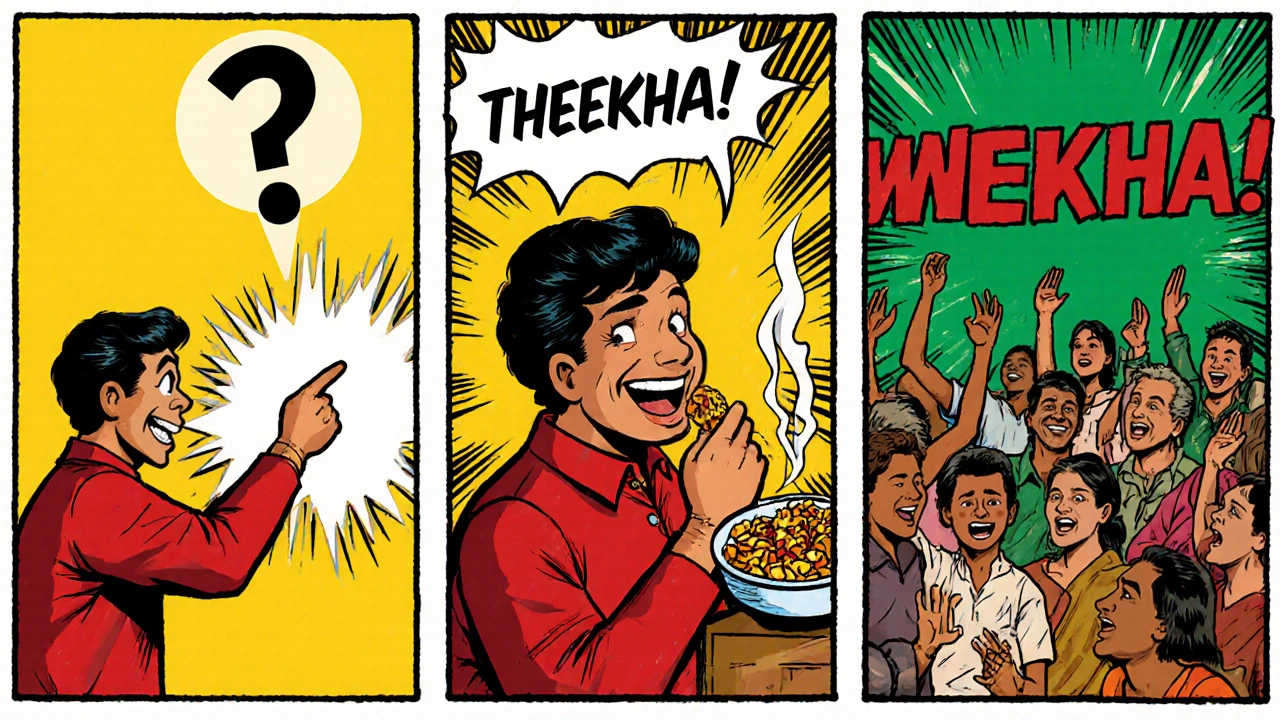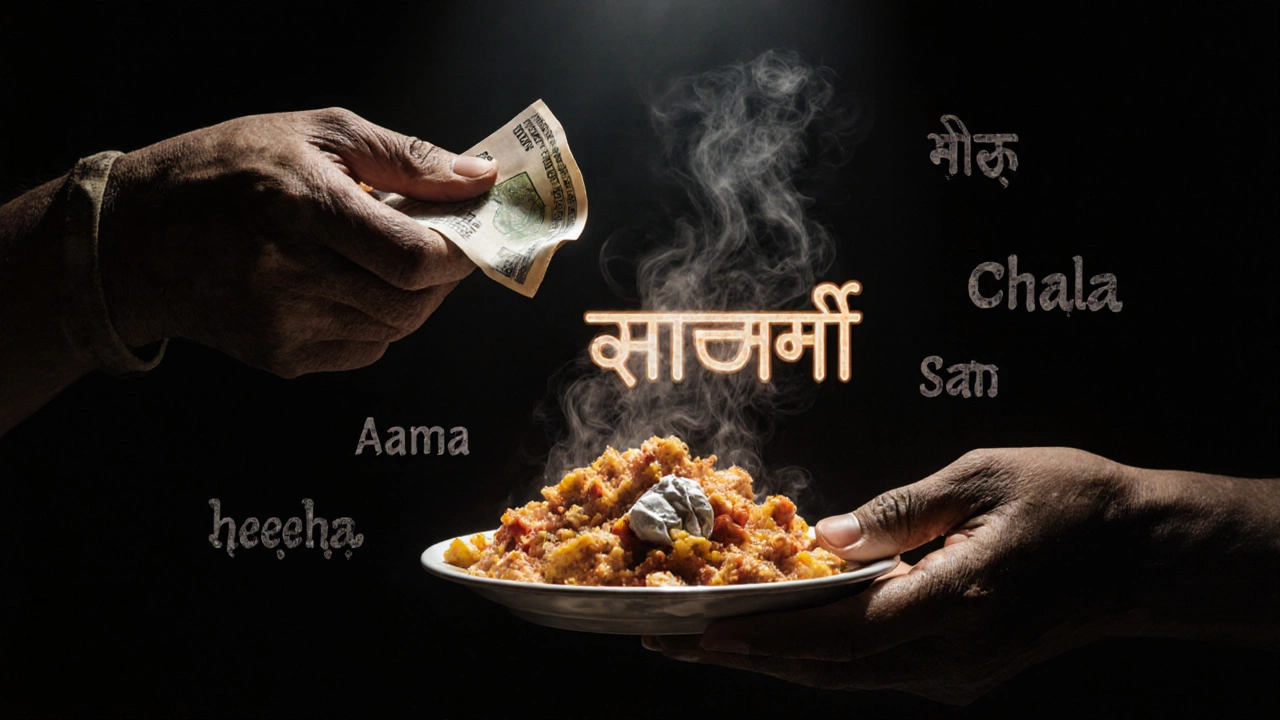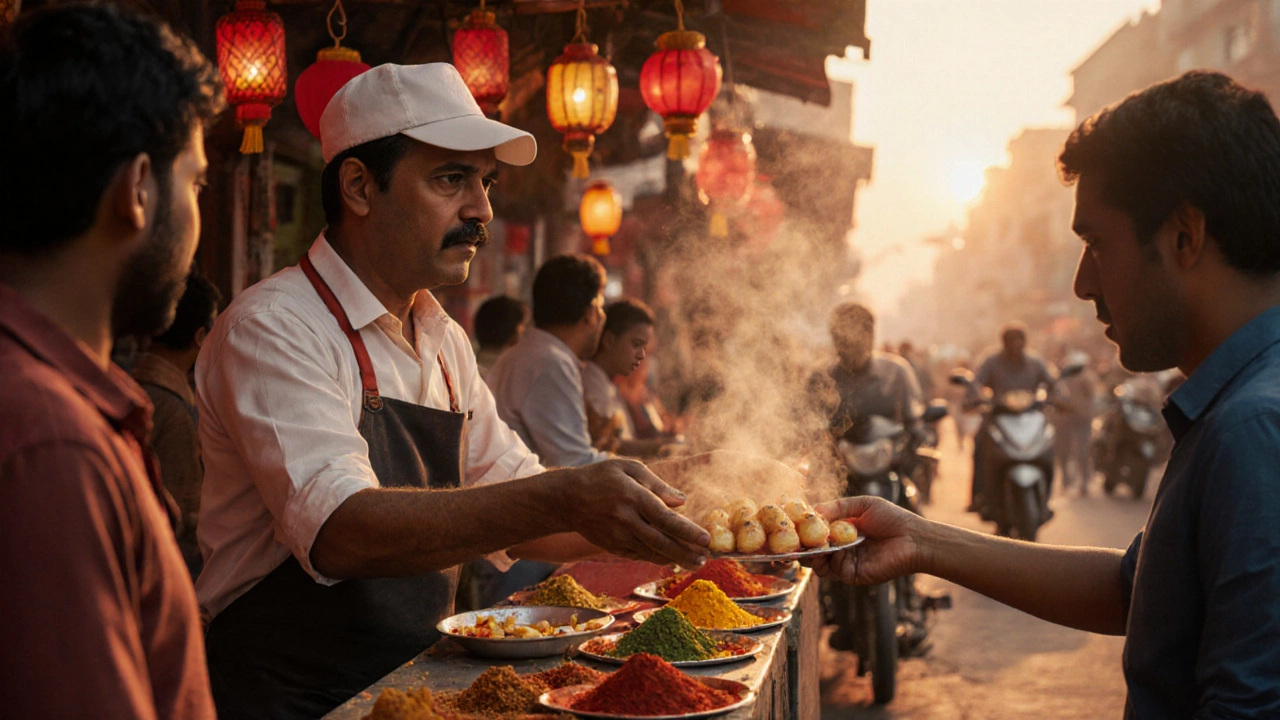Street Food Slang Translator
Your translation will appear here
How to use it:
When ordering street food in India, replace English phrases with street slang to blend in faster. Just say the translated phrase and add "Theekha" for confirmation.
- Less spice please: "Thoda mirchi, theekha!"
- One plate, extra chutney: "Ek plate, zyada chutney, theekha!"
- How much?: "Kitna hai?" → "Panchas de, theekha!"
- Make it fast: "Jaldi, please." → "Jaldi, theekha!"
Walk into any busy street food stall in Delhi, Mumbai, or Kolkata, and you’ll hear a rhythm of calls, laughs, and quick replies. The vendor shouts, "Chai garam!" The customer points at the vada pav. The vendor nods and says, "Haan, sahi" - then adds a quick, almost musical "Theekha?" You don’t need to speak fluent Hindi to get by. But if you want to blend in, understand the vibe, and get your food faster, you need to know one word: theekha.
It’s Not ‘Okay’ - It’s ‘Theekha’
When someone in India says "Theekha", they’re not talking about spice. They’re saying "Okay," "Got it," or "All set." It’s the most common, natural, and widely used slang for agreement across North and Central India. You’ll hear it from chai wallahs, dosa makers, and even auto drivers. It’s casual, fast, and packed with local flavor.
Think of it like saying "Aight," "Cool," or "Roger" in English. It’s not formal. You won’t find it in textbooks. But if you’re eating pani puri in Jaipur or bhel puri in Mumbai, and the vendor says "Theekha!" after you ask for less chutney - that’s their way of saying "Done. No problem."
Regional Variations - It’s Not Just One Word
India has over 22 official languages and hundreds of dialects. So naturally, "okay" has many flavors. In South India, especially Tamil Nadu and Karnataka, you’ll hear "Aama" or "Aamaa" - a soft, drawn-out sound that means "Yes, I hear you." In Andhra Pradesh and Telangana, "Chala" is common - short for "Chalavu" (meaning "go ahead").
In Maharashtra, you’ll often hear "Thik ahe" - Marathi for "It’s fine." In Bengal, vendors might say "Haa, theke" - a mix of Bengali and Hindi. And in parts of Punjab, you’ll hear "Sahi" - which literally means "correct," but in context, it’s the same as "Okay."
But if you’re standing in front of a chaat stall in Delhi, and you want to be understood by everyone - from the guy frying samosas to the guy sweeping the street - "Theekha" is your safest bet. It’s the lingua franca of street food.
How to Use It - Real-Life Examples
You don’t need to be fluent. Just drop it in the right moment.
- You: "Less mirchi, please." Vendor: "Theekha!" - That means they heard you and will do it.
- You: "One plate, extra chutney." Vendor: "Theekha!" - They’re already making it.
- You: "How much?" Vendor: "Fifty rupees." You: "Theekha." - You’re agreeing to the price.
Notice something? You’re not just saying "okay." You’re joining the rhythm. The vendor doesn’t need a long conversation. They need a quick signal. "Theekha" is that signal.
Try saying "Okay" in a Mumbai street food line. People will understand you. But they’ll also smile. Because you’re speaking English. When you say "Theekha," you’re speaking their language.

Why This Matters - More Than Just Words
Street food in India isn’t just about taste. It’s about connection. It’s about trust. You’re handing your money to a stranger, and they’re handing you food cooked in front of you. That’s a leap of faith. Saying "Theekha" is like nodding your head and saying, "I see you. I trust you."
It’s the same reason vendors don’t say "Thank you." They say "Dhanyavaad," but more often, they just smile and say "Theekha." The transaction is complete. No need for more words.
When you use this slang, you’re not just ordering food. You’re stepping into a culture that values speed, respect, and simplicity. You’re no longer a tourist. You’re a regular.
What Not to Say - Common Mistakes
Don’t overthink it. Don’t say "Okay, thank you very much." That’s polite, yes. But in a 30-second food exchange, it slows things down. Vendors don’t have time for full sentences. They need quick, clear signals.
Also, avoid saying "Yes," unless you’re answering a yes/no question. "Yes" alone sounds stiff. It’s not natural here. "Theekha" carries the weight of "yes," "got it," and "I’m good with that" all in one.
And don’t try to mimic the accent too hard. Just say it plainly: "Theek-ha" - with a soft "h" at the end. No need to roll your Rs. It’s not a performance. It’s communication.

Other Useful Street Food Phrases
While "Theekha" is your golden word, here are a few others that’ll make your street food experience smoother:
- "Thoda" - A little ("Thoda mirchi" = a little spice)
- "Zyada" - More ("Zyada chutney" = more chutney)
- "Kam" - Less ("Kam namak" = less salt)
- "Ek plate" - One plate
- "Jaldi" - Fast ("Jaldi banao" = make it fast)
Combine them with "Theekha" and you’re speaking street food fluently.
It’s Not Just About Food - It’s About Belonging
Learning this slang isn’t about memorizing vocabulary. It’s about understanding how people really talk when they’re busy, hungry, and living in the moment. The street food culture in India thrives on efficiency and warmth. There’s no time for formalities. But there’s always room for a quick, friendly "Theekha."
When you say it, you’re not just getting your food. You’re becoming part of the rhythm. You’re nodding along with the sizzle of the oil, the clatter of plates, the shout of the vendor, and the laughter of the crowd.
That’s the real magic of Indian street food. It’s not just about what’s on the plate. It’s about the language that brings it to you.
Is "Theekha" the only word for okay in India?
No, "Theekha" is the most common in North and Central India, but other regions use different words. In Tamil Nadu, people say "Aama"; in Maharashtra, it’s "Thik ahe"; in Bengal, you might hear "Haa, theke." But "Theekha" is understood almost everywhere because of Hindi’s widespread use in street markets.
Can I use "Okay" instead of "Theekha"?
Yes, vendors will understand "Okay," especially in tourist areas. But using "Theekha" makes you sound more local and helps you connect faster. It’s like saying "Aight" instead of "Okay, cool" - it’s quicker, more natural, and fits the vibe.
Is "Theekha" rude if I say it too much?
Not at all. "Theekha" is neutral and friendly. It’s not a command or a demand. It’s an acknowledgment. Saying it after your order is polite - it shows you’re listening. Vendors actually appreciate it because it keeps the exchange smooth.
Do I need to know Hindi to use "Theekha"?
No. You don’t need to know any Hindi at all. "Theekha" is one word. Say it like "Tee-kha" - soft "h" at the end. That’s enough. You don’t need grammar, conjugations, or pronunciation lessons. Just drop it in the right moment, and it works.
Is "Theekha" used in restaurants too?
In casual, family-run places - yes. In upscale restaurants, staff might use "Yes, sir" or "Certainly." But even in mid-range eateries with street food menus, "Theekha" is still common. It’s not about the setting - it’s about the energy. If it’s fast, loud, and food is made fresh in front of you, "Theekha" belongs there.
